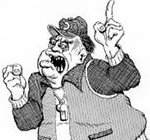Adapted from From Richard Nordquist’s Your Guide to Grammar & Composition.
The freight train style pours on the coal like Casey Jones. It's a style often favored by excited children:
And then Uncle Richard took us to the Dairy Queen and we had ice cream and I had strawberry and the bottom of my cone fell off and there was ice cream all over the floor and Mandy laughed and then she threw up and Uncle Richard took us home and he didn't say much the whole way.
And by the 19th-century American poet Walt Whitman:
The early lilacs became part of this child,
And grass, and white and red morning-glories, and white and red clover, and the song of the phoebe-bird,
And the Third-month lambs, and the sow’s pink-faint litter, and the mare’s foal, and the cow’s calf,
And the noisy brood of the barn-yard, or by the mire of the pond-side,
And the fish suspending themselves so curiously below there--and the beautiful curious liquid,
And the water-plants with their graceful flat heads--all became part of him.
("There Was a Child Went Forth")
It often shows up in the Bible:
And the rain descended, and the floods came, and the winds blew, and beat upon that house; and it fell: and great was the fall of it.
(Matthew, 7:27)
And Ernest Hemingway built his career on it:
In the fall the war was always there, but we did not go to it any more. It was cold in the fall in Milan and the dark came very early. Then the electric lights came on, and it was pleasant along the streets looking in the windows. There was much game hanging outside the shops, and the snow powdered in the fur of the foxes and the wind blew their tails. The deer hung stiff and heavy and empty, and small birds blew in the wind and the wind turned their feathers. It was a cold fall and the wind came down from the mountains.
("In Another Country")
Watch for it in your readings (more likely fiction than non-fiction). Next time I’ll discuss when to ride the freight train and when not to.
Monday, December 31, 2007
Subscribe to:
Post Comments (Atom)







No comments:
Post a Comment